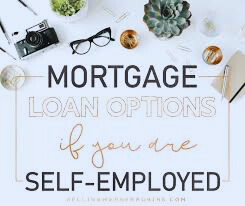Introduction:
Navigating the mortgage landscape can be challenging, especially for self-employed individuals. Unlike traditional employees, self-employed workers often face unique hurdles when applying for a mortgage. However, with the right information and preparation, securing a mortgage is entirely achievable.
In this blog post, we’ll explore various mortgage options tailored for self-employed individuals, tips for a successful application, and factors to consider when choosing the best option for you.
Understanding Self-Employment and Mortgages
Self-employed individuals typically include freelancers, independent contractors, business owners, and those with side hustles. Lenders view self-employment differently than traditional employment, often requiring additional documentation to assess income stability. Here are some mortgage options available specifically for self-employed borrowers.
1. Traditional Mortgages
Conventional Loans
Conventional loans are often available to self-employed individuals, but they come with specific requirements. Typically, lenders will request at least two years of personal and business tax returns, profit and loss statements, and bank statements. A strong credit score (usually above 620) and a low debt-to-income (DTI) ratio are also essential.
FHA Loans
FHA (Federal Housing Administration) loans can be an excellent option for self-employed individuals, especially first-time homebuyers. These loans have more flexible credit score requirements and lower down payments. While you’ll still need to provide documentation of income, FHA loans can be more forgiving for self-employed borrowers.
2. Non-QM Loans
Non-Qualified Mortgage (Non-QM) loans cater to borrowers who don’t fit the traditional mold. These loans often come with more lenient requirements, making them suitable for self-employed individuals with fluctuating incomes. Lenders may accept bank statements instead of tax returns to verify income, simplifying the process.
3. Bank Statement Loans
Bank statement loans are specifically designed for self-employed individuals. Instead of relying on traditional income documentation, lenders use bank statements to determine income. This option is particularly beneficial for those who might write off significant expenses on their taxes, resulting in lower reported income.
4. Portfolio Loans
Portfolio loans are another viable option for self-employed borrowers. These loans are held by lenders rather than being sold on the secondary market, allowing them to set their own guidelines. This flexibility can be advantageous for self-employed individuals, as lenders may consider other factors beyond credit scores and income documentation.
Tips for Self-Employed Individuals Seeking a Mortgage
Organize Financial Documents: Prepare at least two years of personal and business tax returns, profit and loss statements, and bank statements. Being organized can streamline the application process.
Maintain a Strong Credit Score: A higher credit score can improve your chances of securing a mortgage and getting better rates. Make timely payments and reduce debt to boost your score.
Consider a Larger Down Payment: A larger down payment can offset perceived risk for lenders, potentially improving your chances of approval and lowering your monthly payments.
Work with a Mortgage Broker: A knowledgeable mortgage broker can help you navigate the options available for self-employed borrowers, matching you with lenders that cater to your unique financial situation.
Document Your Income Consistently: Keeping thorough records of your income and expenses can help prove your financial stability to lenders. Regular bookkeeping can make this process easier.
Conclusion
While obtaining a mortgage as a self-employed individual may require additional documentation and a thorough understanding of your options, it’s entirely feasible. By exploring traditional mortgages, Non-QM loans, bank statement loans, and portfolio loans, you can find the best fit for your financial situation. With proper preparation and the right support, you can confidently take the next step toward homeownership.
If you’re self-employed and ready to start your mortgage journey, consider consulting with a mortgage professional who can guide you through the process. With the right approach, homeownership is within your reach!



